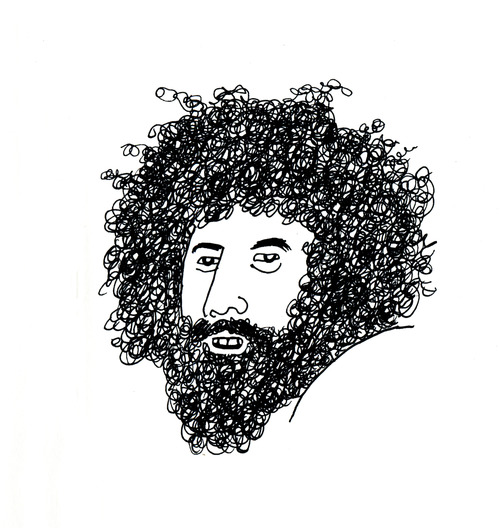
I snuck into the first empty room I could find. It was the producer’s office at the film production company where I am working, and it was also time for my interview with Reggie Watts, a musician / comedian / beat-boxer—a vocal magician, essentially. He also stars in the IFC series “Comedy Bang! Bang!” which just launched its second season in July.
I was in awe of Reggie when I watched him perform for the first time, and admired his ability to improvise and create such original sounds with simply his voice and looping pedals. Reggie suddenly answered the phone, his voice cheerful and booming, and I quickly pressed the record button.
—Julia Edelman
REGGIE WATTS: Good morning.
THE BELIEVER: So, where are you right now?
RW: I am right downstairs from you. [Laughs] Actually I’m in Brooklyn.
BLVR: Have you always wanted to be involved in comedy?
RW: Well, I mean, not necessarily in the beginning, thinking I would have a career in comedy, but I was always interested in making people laugh.
BLVR: How much of your performance is improvised, and how much is planned? Is there any structure to it?
RW: I mean there’s kind of a structure, because I have a set up where I have a microphone and a keyboard on the side, so those are kind of my areas that I can go to.
BLVR: What have you learned from improvising in your shows?
RW: I keep making discoveries now and then, but you really have to free up your mind and not get locked into one specific thing, or way of doing things. Always make sure you’re not falling into too many patterns, to keep it interesting.
BLVR: What pushes you to create new material?
RW: It’s just the love of discovering new things, and talking about what I believe in, or explaining really ridiculous concepts. As long as I feel like there’s a movement through those types of ideas, it inspires me to keep going. It’s very similar to skateboarding or surfing, something like that, when people have those types of free form sports where they’re just going for it and trying to discover new things.
BLVR: Your performances are often described as “disorienting,” but what do you think essentially makes them so disorienting to the audience?
RW: Because there’s no narrative, there’s no arc necessarily, there’s nothing that really makes sense. It’s very similar to adjusting the dials on a radio or changing channels on TV randomly. There’s no logical narrative, and usually I’m looking for things that are very disparate, so that I’m making sense out of nonsense.
BLVR: Yeah, and I feel like you especially do this when you assume many different characters in your performances. Traditional stand up comedy seems so vulnerable to me, but when I watched you perform, it felt like the multiple characters that you took on allowed you to distance yourself from the audience in a way. Do you ever feel you do this?
RW: Well, comedians do that all the time, and make it seem like it’s a little bit more personally connected, but it’s just more subtle. When John Mulaney is onstage telling a joke, he has a poker face, and the poker face is a form of distance. Even though he makes it sound like a personal story, or it may seem like he is getting very personal, he tells that joke in many different places and situations. Many comedians who are joke writers will do the same thing. So even though it seems vulnerable, they still have a plan, or something they’re arriving at that will get you to laugh.
If you’re doing characters or voices, you definitely have a more obvious kind of distancing, but it’s not really a distance. It’s all the same thing when you’re onstage performing, when you’re exposed to anything that could happen or go wrong, or you’re not getting a reaction off of people. It’s the same thing as someone who has written a joke. If they say the punch line and nothing happens, there’s a moment where it’s awkward and weird and it’s the same thing with doing characters or things of that nature. It’s definitely a product of improvisation, because you need to create time to process and receive ideas, so doing characters or physical movement—anything that gives you time to listen to the next idea that wants to happen—is kind of a part of it. But the idea is not to disconnect from the audience, it’s to project a world that the audience is included in, and you’re the master storyteller.
BLVR: You also produce video sketches. What is the writing process for those like? Are those ever improvised at all?
RW: Yeah, especially with an idea that I have, an entire story will unfold, and I’ll remember the story and not write it down, just remember the whole concept of it. Then I’ll work with the director and we’ll have a meeting and write down all the points and flesh out some ideas, create a shot list and just go and shoot it.
BLVR: I know you recently started JASH, a comedy collective featuring Sarah Silverman, Tim & Eric, and Michael Cera. How is JASH different from other projects you’ve worked on?
RW: I think with JASH, the idea is to bring a TV sensibility and a TV production element to the online community, specifically YouTube. YouTube is notoriously known for its shitty quality, just a lot of shitty things, but human things, things people can connect to, because it’s everyday people posting things. But on a production level it’s not very sophisticated, so the idea was to give it something that has a really high-quality element to it and consistently kind of use that TV expertise to bring all of these shows to the Internet.
Illustration Credit: Lucas Adams




